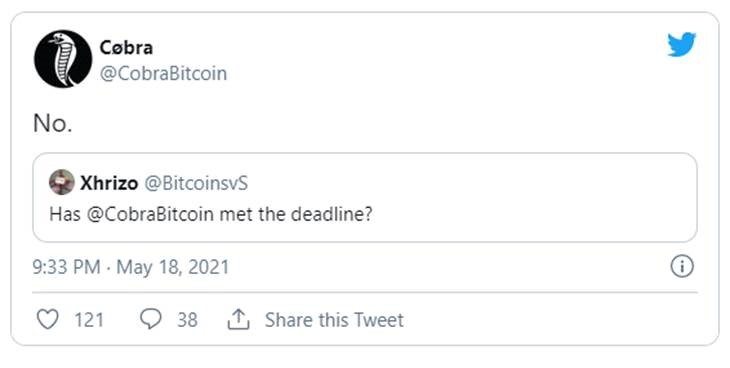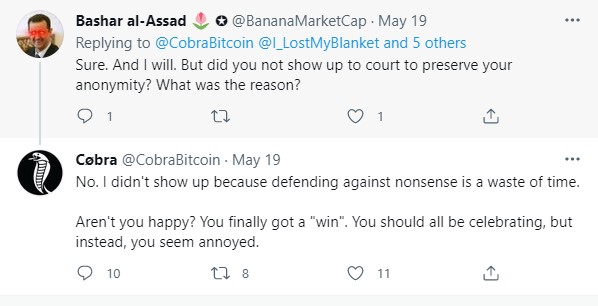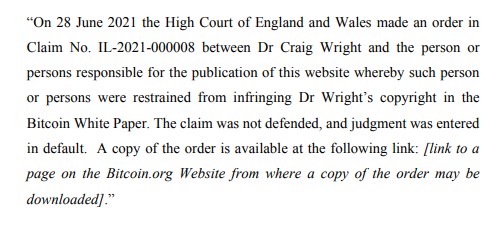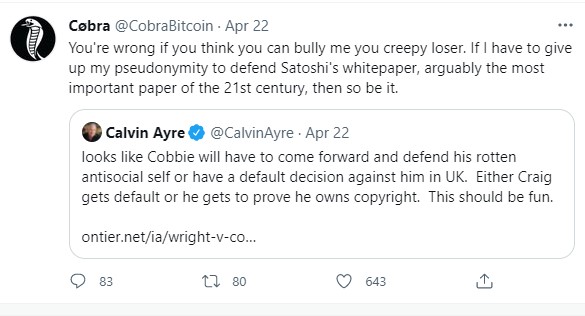Wright v Cøbra: How Satoshi took back the Bitcoin white paper from BTC

The first of Dr. Wright’s copyright infringement claims has now reached its conclusion. Barely two months since the filing of Dr. Wright’s lawsuit against bitcoin.org operator Cøbra, the English High Court has found in favor of Dr. Wright, recognizing his copyright in the white paper and ordering that Cøbra cease infringing Dr. Wright’s copyright by removing the Bitcoin White Paper from the website and Github associated with the website in the U.K.
It is the first of Dr. Wright’s copyright lawsuits to be resolved, but it won’t be the last. In addition to those who have already been put on notice that they are infringing his copyright in the white paper, Dr. Wright has made it clear he intends to enforce his rights against those who he says are using the white paper to promote products which bear no resemblance to the product it describes.
If Cøbra’s experience is anything to go by, they have a lot to look forward to.
The beginning
To make sense of Dr. Wright’s white paper litigation, one has to go back to the day Bitcoin was first released into the world.
The digital asset era was kicked off by the distribution of a now famous document in 2008 titled Bitcoin: A Peer-to-Peer Electronic Cash System. It was released under the name Satoshi Nakamoto and described the principles of Bitcoin: a secured, stable, trustless, peer-to-peer system of electronic cash which could be scalable, low-cost and useable. and would precipitate the release of the first version of the Bitcoin software in January the next year.
Looking at the excitement generated by the system described in the white paper at the time and the prominence of digital assets in 2021, it makes sense that the paper which started it all remains a revered document among the community.
Today, the white paper is hosted on the website of virtually any project which purports to have a connection to Bitcoin, even where those projects are antithetical to the system of electronic cash described by its author. One of these is bitcoin.org, originally used by Satoshi Nakamoto in the early days of Bitcoin – which means that despite what happened in the years since his disappearance, Dr. Wright is still the beneficial owner of the site.
Since being outed as Satoshi Nakamoto in 2015, Dr. Wright has been consistent in his approach to Bitcoin and the white paper: he is the creator of both, and therefore the copyright in those works is his. Long before Cøbra had received any infringement notice, Dr. Wright was writing about the problem of his intellectual property being exploited to give credibility to products which are antithetical to his original creation. The legal terminology for what is happening is called “passing off”.
Right at the beginning of 2021, the digital asset world saw the natural outcome of this.
Infringement letters issued
On January 21, Dr. Wright instructed his lawyers (the London offices of ONTIER LLP) to issue copyright infringement notices to five parties hosting the white paper. The letters put the recipients on notice that Dr. Wright is the author and copyright owner of the white paper and that he does not consent to the publication of the paper.
The five recipients were the individuals who control the websites Bitcoin.org, Bitcoin.com and bitcoincore.org. These are far from the only sites hosting the white paper: in fact, if all who received a letter were to take down the white paper from their respective websites, it would have very little effect on its general availability.
So why bother at all? Dr. Wright released a statement shortly after the letters were made public. In it, he gave his reasons for taking action on the hosting of the white paper: “The Bitcoin system described in the white paper is not ambiguous. It is not open to interpretation. It is a peer-to-peer system of electronic cash… And yet today, organisations use the Bitcoin name and the white paper itself to promote coins and products which they know to be inconsistent with the system as originally described.”
“As the author of the white paper, I feel compelled to exercise my legal rights to ensure that it cannot be marketed in such a way.”
Dr. Wright’s point—that the white paper is being used to promote unrelated and unaffiliated products—is evidently true looking at his choice of defendants. Bitcoin.org, bitcoin.com and bitcoincore.org are all hosting the white paper in connection with the coins they are selling and promoting, and yet all represent materially distinct projects: for example, if the BTC being promoted by bitcoin.org is reflective of the white paper, then the BCH being promoted by bitcoin.com cannot also be reflective of the white paper.
The reality is that none of them do – and they all know it.
Who is Cøbra?
One of the defendants—and the first of Dr. Wright’s white paper actions to reach a resolution as of publication – is a person going by the pseudonym Cøbra. Having received Dr. Wright’s preliminary letter in January, Cøbra evidently responded by refusing to comply with its demands and seemed ready to meet the plaintiff in court:
Though Cøbra’s real identity is elusive, he’s been around the space long enough to have left a considerable paper trail. He is well-known within the BTC community as being in charge of the bitcoin.org website, which was originally associated with Satoshi Nakamoto’s Bitcoin project but has since changed hands and is now used to exclusively promote BTC, a project which Cøbra himself has implied he knows to be different from the White Paper. CoinGeek recently dove into the Cøbra persona and came up with a rather complete picture of the person: among other things, Cøbra is a 9/11 truther, has advocated for assassination markets, and once equated Barack Obama with Adolf Hitler.
What remains out of public knowledge is exactly which person is behind the Cøbra pseudonym. Because of this, the U.K. court granted Dr. Wright permission to serve Cøbra with the copyright infringement suit out of jurisdiction on April 21—in the U.K., a claimant must seek and obtain permission from the court in order to serve papers on a defendant who is not known to be located within the country. With Cøbra remaining pseudonymous, this was a necessary step for Dr. Wright to pursue his claim.
Cøbra was formally served on April 26, and was given 22 days to respond to the claim. This left the defendant with a choice: defend the case or ignore it. Defending the case would mean exposing his identity; anonymous defendants don’t typically make good clients for lawyers, and the procedure rules of the U.K. courts would compel Cøbra to reveal his identity if he wanted to make submissions in his defence.
Cøbra initially signalled that he would be giving up his anonymity to defend the case:
However, the deadline came and went with no formal acknowledgement from the defendant. Less than a month after the above promise to defend ‘arguably the most important paper of the 21st century’ Cøbra confirmed that he would not be defending the case:




Dr. Wright wins default judgment
Having received no response from Cøbra, Dr. Wright’s legal team filed an application for default judgment against him. Under U.K. civil procedure rules, the court can award a default judgment in favor of the plaintiff if the defendant fails to respond within the relevant time.
The application was heard on June 28, when the English High Court awarded default judgment to the plaintiff, effectively resolving the lawsuit in Dr. Wright’s favor. The court ordered that Cøbra no longer be allowed to make the white paper available in the United Kingdom and must publish the following statement on bitcoin.org for at least six months:


On top of that, Cøbra must pay the plaintiff’s legal costs in the matter (preliminarily set at £35,000) and ordered an inquiry as to the damages caused by the copyright infringement, with Cøbra on the hook for the full amount.
Conclusion
Cøbra was formally served with Dr. Wright’s copyright infringement suit on April 26. By June 29, just over two months later, Dr. Wright had won and bitcoin.org had been ordered to cease hosting the white paper in the U.K. For a case in which the defendant has still never been identified, Dr. Wright secured his desired outcome in the blink of an eye.
It’s undoubtedly a victory for Dr. Wright, Bitcoin and intellectual property rights generally. However, a fast and early defeat for Cøbra has once more deprived Dr. Wright of the opportunity to fight his critics and libelers in the most appropriate venue: not on social media but in a courtroom where real evidence can be submitted and adjudicated. Of course, Cøbra—like Peter McCormack—has no interest in Dr. Wright being afforded any such opportunity: it’s much easier to call someone a liar and pass off their intellectual property from behind a Twitter handle. It turns out it is not so easy to have to stand by these attacks in court. The end result is the same, of course. Dr. Wright’s intellectual property in the White Paper is recognized by the courts and as the growing stack of legal victories would indicate, all that the likes of Cøbra are doing by ducking their day in court is kicking a very embarrassing—and very expensive—can down the road.
As a reminder to Dr. Wright’s previous statement on the matter: “This wasn’t done to limit the public availability of the white paper—quite the opposite. I am proud that when I first posted it online, in 2008, the system described within the white paper generated substantial excitement, which has only grown since. As far as I’m concerned, the more people who read the white paper—actually read it—the better. It would go a long way towards furthering people’s understanding of what Bitcoin is, and what it is not.”
The first act of Dr. Wright’s quest to reclaim the white paper is complete: on to the next one.
Source: Read Full Article


